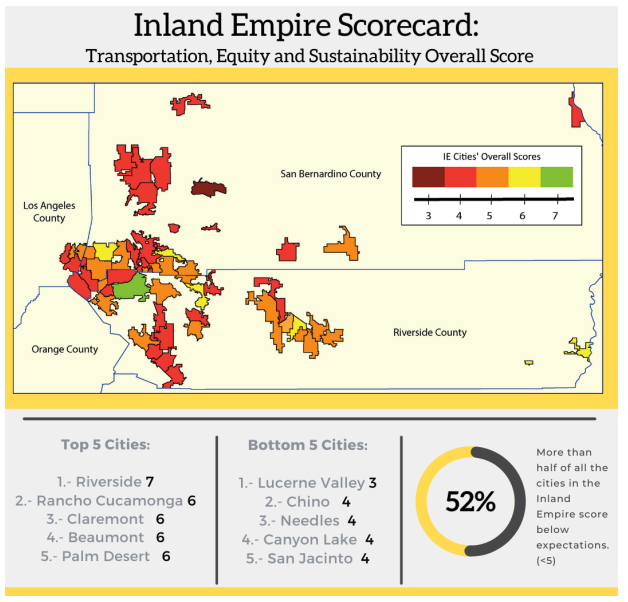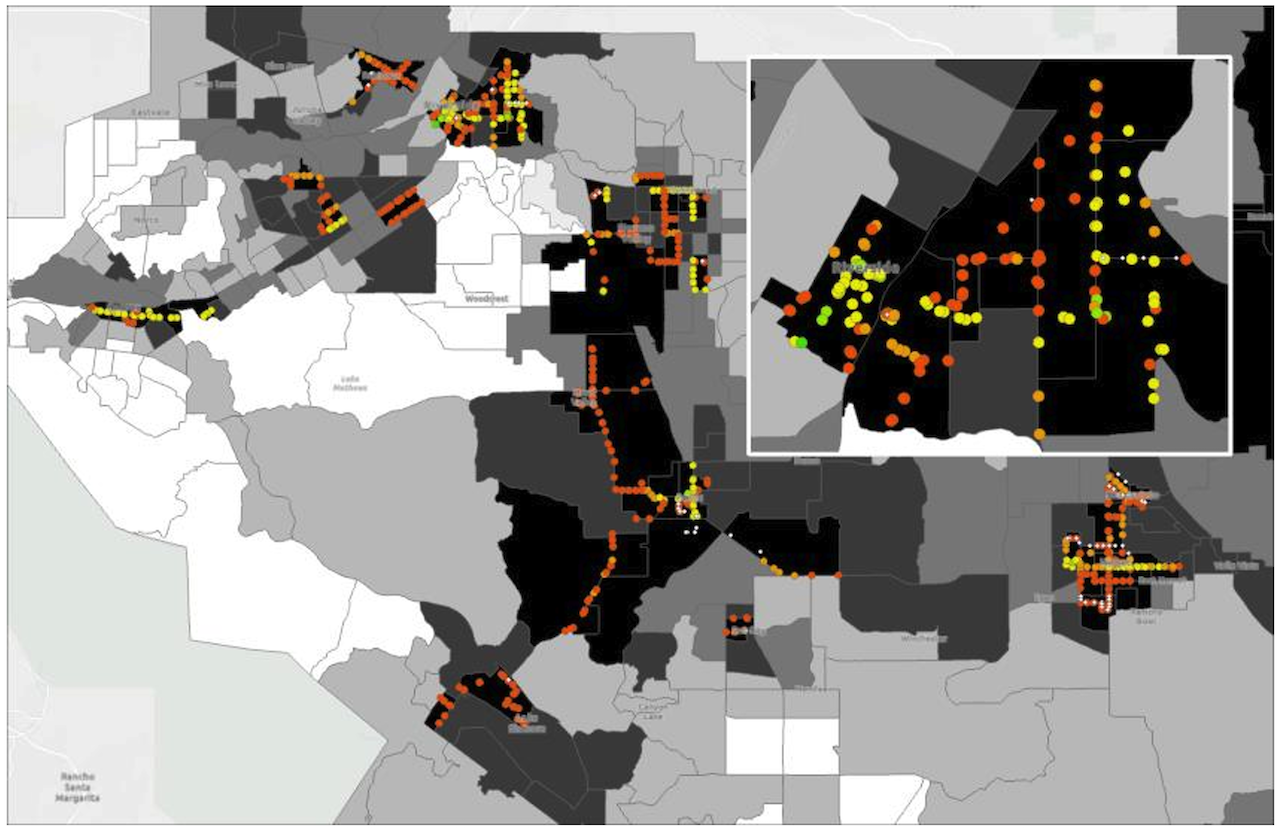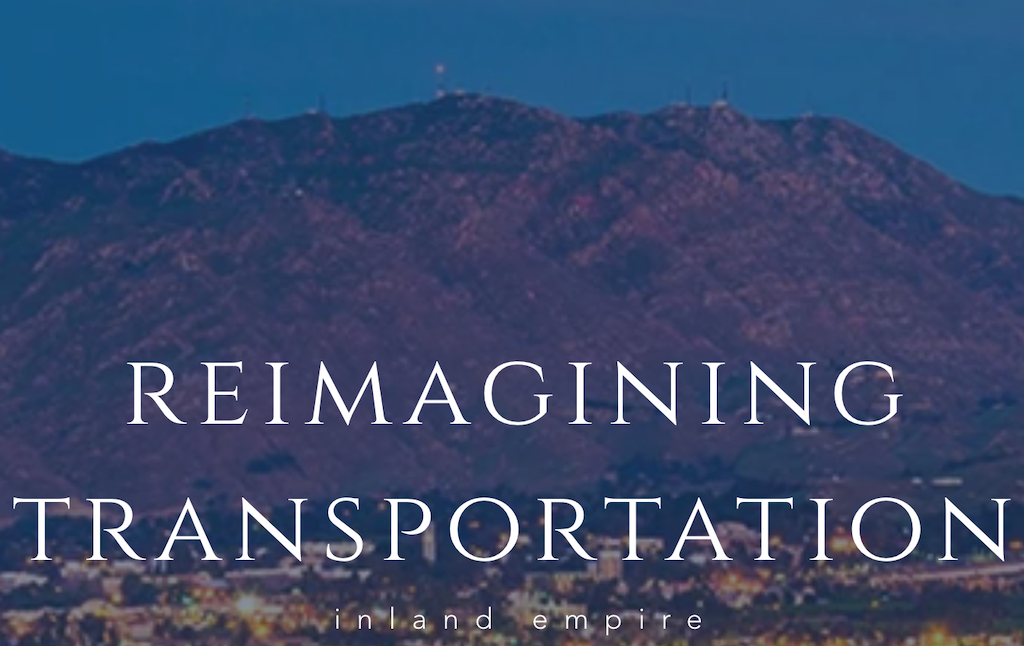Transportation Research Policy Brief
Transportation, Sustainability, and Equity Scorecards in the Inland Empire

William and Barbara Leonard Transportation Center (2022)
The Inland Empire Transportation, Equity, and Sustainability Scorecards aim to quantify and score local government’s efforts on the three aspects of mobility in the region. This work was conducted as part of the LTC’s Student Research Challenge, which brings together students and faculty from CSUSB, the University of California, Riverside, and CalPoly Pomona. The expectation set for the Research Challenge program is to provide real-world research experience for multidisciplinary teams of students and faculty on critical issues related to the Inland Empire’s transportation system. The LTC aspires to meet our dual goals of quality research and education from this work.
Transportation, Sustainability, and Equity Scorecards in the Inland Empire
Shifts in Public Transit Equity during the COVID-19 Pandemic: A Case Study in Riverside, California
Preston Reed; Holly Chea; Sheng Tan; Raffi Der Wartanian, Ph.D.; Yongping Zhang, Ph.D.; Yunfei Hou, Ph.D.; and Kimberly Collins, Ph.D.
 A prime component of any effective public transportation system is equitable access for all riders within the community. Building transportation networks with equity in mind can boost ridership and transit network coverage. The problem of social equity in transportation is further exacerbated by historically auto-dependent cities and the pandemic restrictions from COVID-19. This paper aims to quantify transit equity using a disadvantage index. These results are then applied to different periods of a transit system throughout the COVID-19 pandemic to see how it affected social equity in public transportation as part of a case study in Riverside, California. Heat maps are overlaid on the transit network’s lines and stops using geographic information systems (GIS) software to visualize the variables associated with transit equity calculations. Publicly released General Transit Feed Specification (GTFS) data is used to plot the state of the transit network at different points in time. The results show that route changes during the COVID-19 pandemic had a noticeable but minimal effect on social equity in transportation.
A prime component of any effective public transportation system is equitable access for all riders within the community. Building transportation networks with equity in mind can boost ridership and transit network coverage. The problem of social equity in transportation is further exacerbated by historically auto-dependent cities and the pandemic restrictions from COVID-19. This paper aims to quantify transit equity using a disadvantage index. These results are then applied to different periods of a transit system throughout the COVID-19 pandemic to see how it affected social equity in public transportation as part of a case study in Riverside, California. Heat maps are overlaid on the transit network’s lines and stops using geographic information systems (GIS) software to visualize the variables associated with transit equity calculations. Publicly released General Transit Feed Specification (GTFS) data is used to plot the state of the transit network at different points in time. The results show that route changes during the COVID-19 pandemic had a noticeable but minimal effect on social equity in transportation.
Transportation, Sustainability & Equity in the I.E.
As the Inland Empire continues to expand and develop, how can government, investors, and developers plan and implement the transportation system to support the creation of jobs and other essential sites to improve the efficient mobility of goods and people in an equitable and sustainable fashion?
The inaugural LTC Research Group Challenge focused on the issues of sustainability and equity in the Inland Empire's transportation system.
Adapting to Smart Transportation 2.0 in the I.E.
Smart Cities Student Independent Study
 The LTC collaborated with University of California, Riverside (UCR) in an independent study course for UCR political science students. Under the guidance of Professor Ronald Loveridge (UCR) and Professor Kimberly Collins (CSUSB), the student researchers defined the key issues to smart transportation in the region. Their work included a review of the pertinent literature and interviews with regional transportation leaders. A primary goal of the work was to analyze the policy capabilities and organizational framework of local and state governments to see if the current governing bodies are ready to adapt to smart transportation 2.0 technologies. The full analysis can be found in the following website:
The LTC collaborated with University of California, Riverside (UCR) in an independent study course for UCR political science students. Under the guidance of Professor Ronald Loveridge (UCR) and Professor Kimberly Collins (CSUSB), the student researchers defined the key issues to smart transportation in the region. Their work included a review of the pertinent literature and interviews with regional transportation leaders. A primary goal of the work was to analyze the policy capabilities and organizational framework of local and state governments to see if the current governing bodies are ready to adapt to smart transportation 2.0 technologies. The full analysis can be found in the following website:

City of Rialto Safe Routes to School Project
Parents of school children have become skeptical of letting their children walk or bike to school due to traffic safety, crime, access to transportation, pollution, health issues and other factors.
The CSUSB Leonard Transportation Center has been working closely with the City of Rialto in providing research assistance with the development of a grant application for the Safe Routes to School (SR2S) program. The grant provides funding for infrastructure projects that aim to make walking and biking safer for students of Rialto schools.
The Leonard Transportation Center assisted by:
- Providing recommendations on the best practices for community outreach.
- Providing different funding strategies for program sustainability.
- Conducting a socioeconomic and environmental analysis of potential program barriers.
- Compiling prevalent academic literature on the topic of Safe Routes to School.